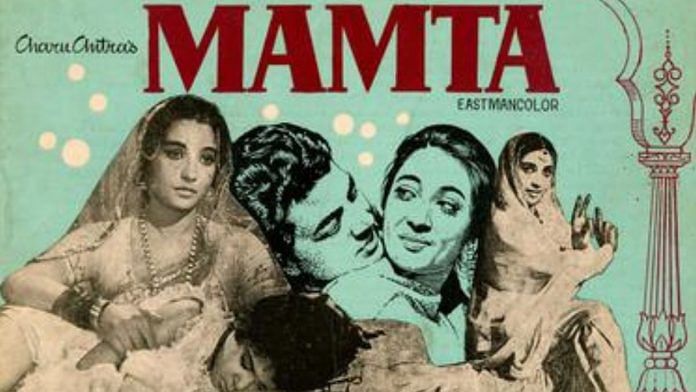There is no doubt that Suchitra Sen’s 1966 film Mamta captures the essence of maternal love. But this Asit Sen-directed film also poignantly captures class struggles, prejudice against women, the value of human life, and portrays relationships that are not bound by societal definitions.
A Hindi remake of the Bengali film Uttar Falguni (1963) by the same director, Mamta is one of those films that belong to its female character — in this case, Suchitra Sen, who plays a double role of mother and daughter., Sen is the grandmother of actresses Riya Sena and Raima Sen. The film also stars stalwarts Ashok Kumar and a young Dharmendra.
Ahead of Suchitra Sen’s birthday on 6 April, ThePrint revisits this classic.
The story revolves around the resilient mother Pannabai (Suchitra Sen), a well-known courtesan in Lucknow. Her estranged and abusive husband, Rakhal (Kalipada Chakraborty), often lands at her kotha attempting to blackmail her and take away their young daughter, Suparna.
In an effort to give her a better life, Pannabai tries to admit her daughter to a prestigious convent boarding school, but the Principal refuses on account of Pannabai’s profession.
The film then dives into Pannabai’s past as she narrates her tale of woe to the principal. Before she became a courtesan, she was Devyani, who grew up in a debt-ridden family with a single father. She was in love with Monish (Ashok Kumar). But his promise of eternal love and companionship was broken when he left for England to become a barrister. In his absence, Devyani’s father married her off to Rakhal in order to repay a loan.
Devyani found herself in an abusive and unhappy marriage. She runs away one day, with her daughter, intending to kill herself. But is saved by a brothel owner Meena Bai, which marks her transition to who she is now.
The principal yields, but puts forward one condition — the young girl cannot remain in touch with her mother. Pannabai accepts.
As Suparna leaves, Monish comes back into Pannabai’s life. The second half of the film explores whether she will find her way back to her ex-lover and her daughter.
Even with all its strengths, Mamta is part of a long list of Hindi films that glorify the sacrificing mother. From Mother India to Deewar, these films have reinforced the idea of an ideal mother — one who is ready to let go of her identity and dreams in the best interest of her children.
Also Read: Guddi — Jaya Bhaduri’s debut, a coming-of-age story, and one of India’s best ‘fan films’
Subtle but strong acting
Suchitra Sen’s range as an actor—a talented dancer, a resilient mother, a fierce lover—is on full display. And as a tragedy queen, she gives fierce competition to Meena Kumari.
When she slips into her role as a grown-up Suparna, she’s almost unrecognisable from her time on screen as Pannabai. If you aren’t familiar with the face of a young Suchitra Sen, you can very well mistake them to be two different people.
The vulnerable yet kind Monish is played by Ashok Kumar to perfection. He plays the role of a faithful lover, but his doubts on seeing how his Devyani has become Pannabai are depicted with mastery. In typical Bollywood fashion, his turmoil melts away in a song.
Dharmendra has a short role, that of Suparna’s lover, but plays a capable companion in all her dilemmas and inner struggles.
The commentary on class is subtle yet effective. It first manifests in Devyani and Monish’s relationship. His mother objects to their relationship as their family is of higher social standing than hers. Asit Sen also contrasts the way society views an ‘educated’ woman and a courtesan — as if a piece of paper decides how human you are.
Suchitra’s role as a courtesan is carefully depicted. Unlike many Hindi films in the later era, it doesn’t confuse the role of a courtesan with that of a sex worker. It shows Pannabai as a trained classical singer and dancer and someone who would primarily indulge in performing these art forms.
Also Read: Aar Paar, Guru Dutt’s 1954 film that featured authentic, realistic dialogue by Abrar Alvi
Soulful melodies
One cannot talk about the film without a mention of its fantastic music. Old Hindi film songs were woven into the story seamlessly and were not simply distractions as they are today.
When Monish’s friend invites Pannabai to sing to prove to him how she has turned into a courtesan, Monish listens from behind a curtain. The feeling of disgust is visible. Pannabai sees his face, and sings — Rahte The Kabhi Jinke. She sings, “Dawa tha jinhe hamdardi ka, Khud aa ke na poocha haal kabhi. Mehfil mein bulaya hai ham pe, Hansne ki sitamgaron ki tarah”. It translates to “those who claimed to be sympathetic, never came and asked about my condition, I have been invited to a gathering to be laughed at”.
The song, which describes how she feels better than any dialogue possibly could, forces Monish to reflect and understand his mistake. Lata Mangeshkar’s voice, Majrooh Sultanpuri’s lyrics and Roshan’s music are a perfect combination to elicit such a soul-stirring response.
Another memorable song is Rahein Na Rahein Hum which plays when the young lovers part for the first time.
This article is part of a series called Old Movie Reviews. Read all articles here.
(Edited by Theres Sudeep)



